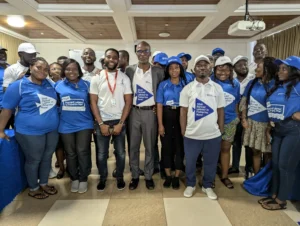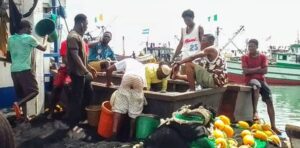Story By: Ishmael Barfi
Ghana is set to overhaul its fishing industry by tackling deep-seated labor issues through a groundbreaking collaboration with the media.
A four-day capacity-building workshop organized by the International Labour Organization (ILO), trained media practitioners to become advocates for labor rights awareness, especially in the fisheries sector, where informal work is prevalent.
The workshop, held in Takoradi, the Western regional capital, follows Ghana’s recent ratification of the ILO’s Work in Fishing Convention (C188) on August 28, 2024.
Emmanuel Kwame Mensah, the National Program Coordinator for the ILO’s 8.7 Accelerator Lab Program, emphasized the crucial role the media will play in the successful implementation of this convention.
The workshop also focused on the media’s potential to bridge the gap between policy and community awareness in the implementation of the C188.

Group picture of Journalists at the workshop
A significant challenge discussed was the lack of formal contracts for workers in the fishing sector. Many fishermen operate under informal agreements, often unaware of their rights. Mr. Mensah emphasized that the media’s new role will be to ensure fishermen understand their rights and demand formal contracts that secure their wages and working conditions.
The training also highlighted the urgent need to address social protection issues, such as pensions for fishermen. A field trip to the Takoradi Fishing Harbour allowed journalists to witness firsthand the challenging working conditions in fishing communities. Many fishers observed during the visit had worked for decades without access to pensions or savings plans.
“A major takeaway for the media is that labor is not a commodity; human beings are behind the figures,” Mr. Mensah stressed. “We must ensure labor rights are integrated into the country’s economic policies.”
The workshop also took a firm stance on child labor. While children often assist in fishing, the line between learning and exploitation can be blurred. Mr. Mensah emphasized that media narratives should differentiate between culturally acceptable forms of child participation in work and harmful labor practices that deny children a future.
“Child labor isn’t justifiable, and the media must make that clear. Just as you can’t justify a young man whose parents are dead and he’s 16 years old and he has to help feed four siblings, and he’s the firstborn, and therefore he decides to do armed robbery, you won’t justify the armed robbery for any reason,” he stated.
Media practitioners were encouraged to use local languages, cultural references, and region-specific content to engage fishing communities. As Mr. Mensah noted, “The success of the convention depends on how well it resonates with the people it’s meant to protect. The media must help localize labor rights, ensuring that fishermen in the most remote areas understand and claim them.”
This media-led approach to labor rights represents a shift from traditional policy enforcement to community-driven advocacy. With the workshop concluded, the drafted media strategy will be finalized and put into action, marking the beginning of a media revolution in the fishing industry. The ultimate goal: a future where Ghanaian fishermen work under safer, more secure, and equitable conditions.
Dr. Daniel Odoom, a lecturer at the University of Media, Arts, and Communication (UniMAC), highlighted the importance of synergy between public and private media, stating that such collaboration would help complement each other’s strengths. This, he explained, would enable both sectors to better serve the public by providing more comprehensive and balanced coverage of important issues.

Some youth in a fishing vessel during the Field Visit
Meanwhile a field trip to the Sekondi Fishing Harbour revealed that many teenagers, aged between 15 and 20, have been drawn into drug use through peer pressure and negative influences.
This issue is particularly concerning as it involves underage children being used for fishing, which violates Article 9 Section 3 of the International Labour Organization’s (ILO) Convention 188 on work in fishing.
Interaction with some of the Fishers pointed fingers at key duty bearers, such as the Ghana Maritime Authority (GMA), accusing them of failing to enforce the convention’s regulations at the harbour.
“The lack of enforcement has allowed these vulnerable teenagers to fall into harmful activities, highlighting the urgent need for stricter oversight and intervention to protect their well-being and uphold international labor standards”, they bemoaned.
Thirty media practitioners from the Greater Accra, Central, Western, and Volta regions participated in the workshop. The attendees included representatives from various stakeholder networks, underscoring the collaborative effort to improve labor conditions in Ghana’s fishing industry.
Source: www.thenewindependentonline.com








